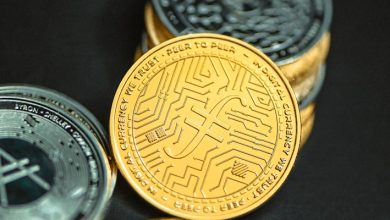What Are Utility Tokens? How They Differ from Security Tokens

- Understanding Utility Tokens and their Functionality
- Exploring the Key Characteristics of Utility Tokens
- Utility Tokens vs. Security Tokens: A Comprehensive Comparison
- The Legal Implications of Utility Tokens in the Cryptocurrency Space
- Utility Tokens: Real-World Use Cases and Examples
- Navigating the Regulatory Landscape for Utility Tokens
Understanding Utility Tokens and their Functionality
Utility tokens are a type of digital asset that provide access to a specific product or service within a decentralized network. Unlike security tokens, which represent ownership in a company or asset, utility tokens are designed to be used within a specific ecosystem. These tokens are usually created through an initial coin offering (ICO) and are distributed to participants who want to access the platform or services offered by the project.
Utility tokens have a variety of functions within their respective ecosystems. They can be used to pay for goods or services, access premium features, or participate in decentralized governance. For example, utility tokens can be used to unlock additional content on a gaming platform, pay for transaction fees on a blockchain network, or vote on proposals for platform upgrades.
One key feature of utility tokens is that they do not represent ownership in the company issuing them. Instead, they are designed to provide utility or access to a specific product or service. This distinction is important because it means that utility tokens are not subject to the same regulatory requirements as security tokens. As a result, utility tokens are often more accessible to a wider range of investors and can be traded more freely on cryptocurrency exchanges.
Overall, utility tokens play a crucial role in the functioning of decentralized networks by providing users with access to the services and products offered by the platform. By understanding the functionality of utility tokens, investors can make informed decisions about participating in ICOs and engaging with blockchain projects that utilize these tokens.
Exploring the Key Characteristics of Utility Tokens
To understand utility tokens better, it is crucial to explore their key characteristics. Utility tokens are digital assets that provide holders with access to a specific product or service offered by a company. Unlike security tokens, which represent ownership in a company or asset, utility tokens serve a practical purpose within a decentralized ecosystem.
One of the main characteristics of utility tokens is their functionality within a specific platform or network. These tokens are designed to enable users to interact with the services or products offered by the issuing company. For example, utility tokens can be used to pay for transaction fees, access premium features, or participate in governance decisions within the platform.
Another important aspect of utility tokens is their tradability on cryptocurrency exchanges. While utility tokens are not designed as investment vehicles, they can be bought and sold on various exchanges to facilitate liquidity. This means that holders of utility tokens have the flexibility to trade them for other cryptocurrencies or fiat currencies if needed.
Furthermore, utility tokens do not represent ownership in the company issuing them, which distinguishes them from security tokens. Instead, utility tokens provide a means of accessing and utilizing the products or services offered by the company. This utility value is what drives the demand for these tokens within the ecosystem.
In conclusion, utility tokens offer a unique value proposition by providing access to specific services or products within a decentralized platform. By understanding the key characteristics of utility tokens, investors and users can make informed decisions about their utility token investments and participation in token ecosystems.
Utility Tokens vs. Security Tokens: A Comprehensive Comparison
When it comes to utility tokens and security tokens, it is essential to understand the key differences between the two. Utility tokens are digital assets that provide access to a specific product or service offered by a company. On the other hand, security tokens represent ownership of an asset or company and usually derive their value from an external, tradable asset.
One of the main distinctions between utility tokens and security tokens is their legal classification. Utility tokens are often considered as a form of digital coupon, allowing holders to access a product or service within a specific ecosystem. Security tokens, on the other hand, are deemed as investment contracts and are subject to securities regulations.
Another crucial difference lies in the functionality of utility tokens and security tokens. Utility tokens are primarily used within a specific platform or ecosystem to enable various functions, such as accessing services, voting rights, or discounts. In contrast, security tokens represent ownership in an underlying asset, entitling holders to dividends, profit shares, or voting rights in the company.
From a regulatory perspective, utility tokens are generally considered as commodities rather than securities, which means they are subject to less stringent regulations. Security tokens, on the other hand, are subject to securities laws and regulations, such as registration requirements and investor protection measures.
When it comes to liquidity, security tokens are typically more liquid than utility tokens, as they can be traded on licensed security token exchanges. In contrast, utility tokens are often limited to trading within a specific platform or ecosystem, which can restrict their liquidity and tradability.
The Legal Implications of Utility Tokens in the Cryptocurrency Space
When it comes to utility tokens in the cryptocurrency space, there are important legal implications that need to be considered. Utility tokens are designed to provide access to a product or service, rather than representing an investment opportunity like security tokens do. This distinction is crucial because it affects how utility tokens are regulated under securities laws.
One key consideration is whether a utility token could be classified as a security by regulatory authorities. If a utility token is deemed to be a security, issuers would need to comply with securities regulations, including registration requirements. This could significantly impact the ability of companies to issue utility tokens and could lead to legal consequences for non-compliance.
Another legal implication of utility tokens is the potential for fraud or misuse. Because utility tokens are not subject to the same regulatory oversight as securities, there is a greater risk of scams or fraudulent activities in the utility token space. Investors need to be aware of these risks and conduct thorough due diligence before investing in utility tokens.
Utility Tokens: Real-World Use Cases and Examples
Utility tokens have a wide range of real-world use cases across various industries. These tokens are designed to provide access to a specific product or service within a decentralized ecosystem. By holding utility tokens, users can enjoy benefits such as discounted fees, access to premium features, and voting rights in decision-making processes.
One common example of utility tokens is within the gaming industry, where players can use tokens to purchase in-game items, unlock new levels, or participate in exclusive events. This creates a seamless and secure way for gamers to interact with the game’s ecosystem without relying on traditional payment methods.
Another use case for utility tokens is in the healthcare sector, where patients can access their medical records securely using blockchain technology. By holding utility tokens, patients can grant access to healthcare providers while maintaining control over their sensitive data. This ensures privacy and security while streamlining the sharing of medical information.
Additionally, utility tokens can be used in the retail industry to incentivize customer loyalty. Retailers can issue tokens to customers for making purchases, referring friends, or engaging with the brand on social media. Customers can then redeem these tokens for discounts, exclusive products, or other rewards, creating a mutually beneficial relationship between the retailer and the consumer.
Overall, utility tokens offer a versatile and efficient solution for accessing and interacting with various products and services in a decentralized manner. Their flexibility and functionality make them a valuable asset in the growing world of blockchain technology.
Navigating the Regulatory Landscape for Utility Tokens
Navigating the regulatory landscape for utility tokens can be a complex and challenging task for issuers and investors alike. It is essential to understand the various regulations and guidelines that govern the issuance and trading of utility tokens to ensure compliance and avoid potential legal issues.
One of the key considerations when navigating the regulatory landscape for utility tokens is determining whether a token is classified as a security or a utility token. This distinction is crucial, as security tokens are subject to stringent regulations under securities laws, while utility tokens are typically subject to less stringent regulatory requirements.
In addition to classification, issuers and investors must also consider the jurisdiction in which the utility token is being issued and traded. Different countries have different regulations governing the issuance and trading of utility tokens, so it is essential to be aware of and comply with the relevant laws in each jurisdiction.
Furthermore, issuers must ensure that they have proper legal counsel to navigate the regulatory landscape effectively. Legal experts can help issuers understand and comply with the regulations governing utility tokens, minimize legal risks, and ensure that the token issuance is conducted in a compliant manner.
Overall, navigating the regulatory landscape for utility tokens requires careful consideration of classification, jurisdiction, and legal counsel. By taking these factors into account, issuers and investors can navigate the regulatory landscape with confidence and ensure that their utility token offerings comply with applicable laws and regulations.



